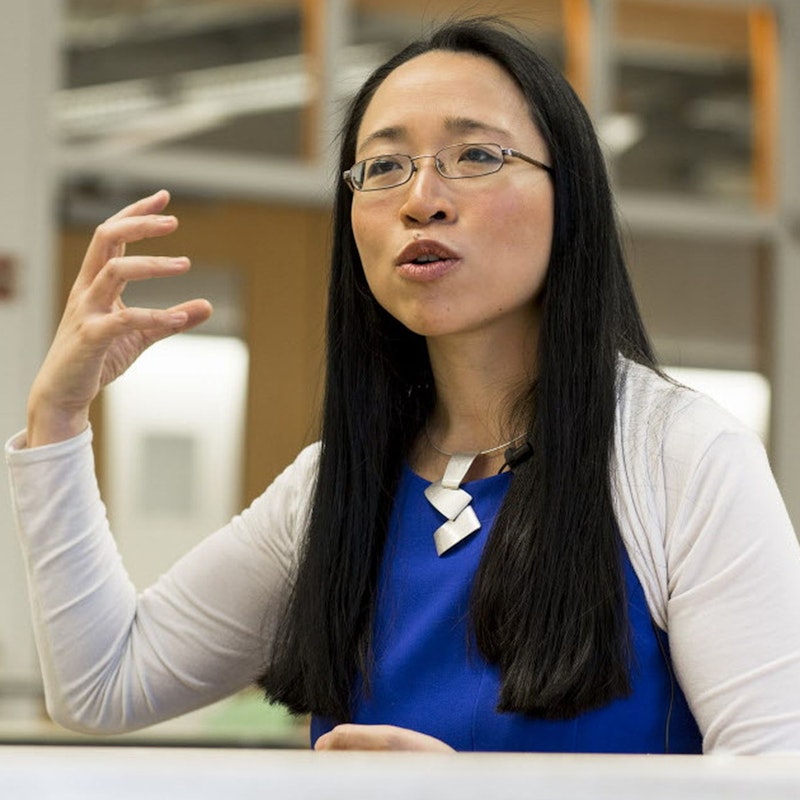Eugenia Cheng is a mathematician, Scientist in Residence at the School of the Art Institute of Chicago, and author of four books. I reviewed her third, The Art of Logic in an Illogical World, two years ago, finding it a valuable effort “to explain the tools of logic as used by mathematicians and demonstrate their relevance in everyday life—and particularly in helping think through divisive political and social issues.”
Whereas Cheng’s first two books, How to Bake Pi and Beyond Infinity, hewed more closely to math, her new work, X + Y: A Mathematician’s Manifesto for Rethinking Gender (Basic Books), continues her more recent delving into the sociopolitical, in this case focusing on fraught issues of men and women in the workplace and beyond. Her approach is shaped by her research focus, category theory, a field that’s spread from pure math to computer science, physics and other areas, burgeoning in importance while remaining little-known to the public.
Category theory is highly abstract, the “mathematics of mathematics,” as Cheng called it in How to Bake Pi. Relying on diagrams filled with arrows, category theory emphasizes relationships among abstract elements. By contrast, set theory, familiar from K-12 education, puts items into collections based on their characteristics. Both theories are “foundational,” in that they can be used as frameworks for organizing and understanding diverse mathematical concepts.
Inspired by the category-theory approach, Cheng looks for a more fluid, context-oriented way of thinking about gender, instead of seeing male and female as clear-cut in their attributes. This translates into skepticism about gender differences being innate and unchanging, or that such differences can justify unequal job statuses and incomes. At the same time, Cheng dislikes “leaning in,” where women seek success by adopting presumed male traits; she recalls with distaste a female executive who immediately bragged about her $5 billion budget.
To reframe discussion of gender issues, Cheng introduces new terms: “ingressive” and “congressive.” Etymologically, the former is for “going into”; the latter for “bringing together.” She defines ingressive thus: “focusing on oneself over society and community, imposing on people more than taking others into account, emphasizing independence and individualism, more competitive and adversarial than collaborative, tending toward selective or single-track thought processes.” Congressive, by contrast: “focusing on society and community over self, taking others into account more than imposing on them, emphasizing interdependence and interconnectedness, more collaborative and cooperative than competitive, tending toward circumspect thought processes.”
Upon reading the above, I came up with other terms that would convey similar meaning, such as “autogressive” and “allogressive.” But since it’s Cheng’s book, which includes a section about “mansplaining,” I’ll adopt her terminology. Importantly, she acknowledges the two tendencies are “not a clean dichotomy,” since people behave in ways that mix them. She presents a diagram with “ingressive” and “congressive” as perpendicular arrows, such that behavior can fall anywhere in between.
Such terminology enables focusing more on behavior than on gender; and recognizing that correlations of behavior with gender have numerous exceptions and change over time. Cheng writes that “men are currently more ingressive” and that “society favors ingressive behavior, with the result that men are more successful and powerful.” Such behavior is broadly harmful, she contends, and so the goal becomes getting individuals and institutions to be more congressive, not “separating men from women and erasing non-binary people in the process.”
X + Y offers various suggestions for reforms. Cheng would make classrooms more collaborative; in math, that would include more “high ceiling, low floor” questions that set few limits on who can contribute or how much they can learn. She’d like to see academic research shared freely, with grants and prizes spread broadly and peer-reviewed journals going by the wayside. She wants workplaces to link promotions to mentorship. She’d like elections that have ranked voting among multiple candidates, rather than a zero-sum contest between the top two.
I don’t share Cheng’s negativity toward competition, at least in degree; my karate school, among other organizations I’m familiar with, adeptly combines competition with collegiality. And I was nonplussed by her seeming amenability to “contemporary definitions of sexism” where “it only counts if it’s by the group that holds power (men) against the group that doesn’t (women).” It’s apparent to me the arrow can go both ways. Yet Cheng also criticizes the “oppression olympics,” discussions where people compete to be the most downtrodden.
As in recent contretemps about 2 + 2 = 5, any effort to employ math in issues that fall under the rubric of “social justice” is bound to cause controversy, as irrelevant or potentially undermining of standards. I suspect X + Y will have some detractors in that regard, as was the case with Cheng’s The Art of Logic. However, if politics can reshape math, math can also reshape politics, injecting rigor and precision where previously was only ideology and rhetoric. Cheng’s two latest books do an admirable job of moving contentious debates in that beneficial direction.
—Kenneth Silber is author of In DeWitt’s Footsteps: Seeing History on the Erie Canal and is on Twitter: @kennethsilber

